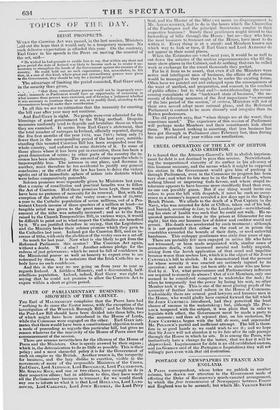STATE OF PARLIAMENTARY BUSINESS; THE SHOWMEN OF THE CABINET.
THE Earl of MALMESBURY complains that the Peers have had "nothing to do since the Easter recess, with the exception of the investigation of the Warwick Borough Bill ;" and he thinks that the Poor-Law Bill should have been divided into three bills, two of which might have been introduced in the House of Lords, while the Commons were engaged on the other. Earl GREY inti- mates that there would have been a constitutional objection to such a mode of proceeding as regards this particular bill, but gives no reason whatever for the inactivity of the House of Peers since the commencement of the session.
There are reasons nevertheless for the idleness of the House of Peers and the Ministers. One is openly avowed by their organs ; which is, the determination to do as little as possible. This is their policy; and a most shameful policy it is for the Government of such an empire as the British. Another reason is, the incapacity for business, and the lazy dislike to exertion, visible in the movements of many of the responsible Ministers of the Crown. Earl GREY, Lord ALTHORP, Lord BROUGHAM, Lord PALMERSTON, Mr. SPRING RICE, and one or two others, have enough to do in their respective offices; but in addition to this, they have nearly all the Parliamentary business to transact ; for we would thank any one to inform us what it i3 that Lord HOLLAND, Lord LANS- DOWNS, Lord CARLISLE, Lord JOHN RUSSELL, the Lord Privy I Seal, and the Master of the Mint (we mean no disparagement to Mr. ABERCROMBY), find to do in the hours which the Chancellor
of the Exchequer and the principal Secretaries employ in their respective bureaus? Surely these gentlemen might attend to the forwarding of bills through the house: but no—they who have
the most business to transact out of the House, have most to do within it. Every thing is at a stand ; and Members known not which way to look or turn, if Earl GREY and Lord ALTHORP do not appear in their usual places.
When the Estimates are voted next year, it would be as well to cut down the salaries of the useless supernumeraries who fill the mere show-places in the Cabinet, and do nothing that can be called work in exchange for the round thousands they pocket. Far be it from us to assert, that even if all the Ministers were active and intelligent men of business, the affairs of the nation would be managed as they ought to be under the existing forms. Often have we pointed out and enlarged upon the consequences of the want of method, and preparation, and concert, in the conduct of public affairs but to what end?—notwithstanding the never- ceasing complaints of the "backward state of business," the ne- cessity of deferring measures of the first importance "on account
of the late period of the session," et certera, Ministers will not of their own accord adopt more rational plans, and the Reformed Parliament is content to be more slovenly and irregular than its Rotten predecessors.
The old proverb says, that "when things are at the worst, they sometimes mend." The experience of this session of Parliament will perhaps make Members and their constituents look about them. We hazard nothing in asserting, that less business has been got through in Parliament since February last, than during the same period of any year within our recollection.




















 Previous page
Previous page